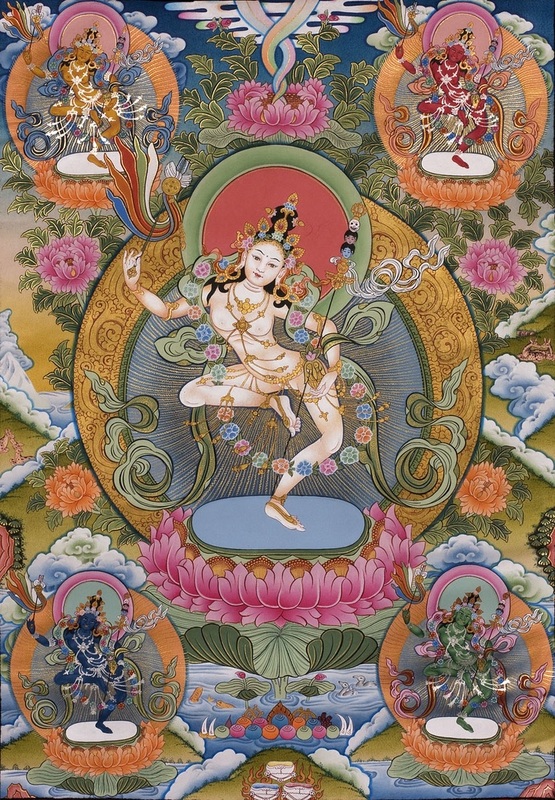|
|
MANDARAVAAccording to hagiographies Mandarava was a wise, virtuous, and beautiful princess, born to a royal couple in Zahor, northeastern India, amidst extraordinary signs. Her father was an incarnation of the Buddha's father Śuddhodana, and her mother was a ḍākinī. Mandarava was an incarnation of the female Buddha Paṇḍāravāsinī, the consort of Amitābha.
Although Mandarava's loving parents fulfilled her every wish, as she grew up she was moved by the inevitability of suffering in saṃsāra. She asked for her parents' permission to devote her life to religious practice, and they consented on the condition that she remain in the palace. In the upper chambers of the palace, Mandarava dedicated herself to studies until she became the greatest scholar in the land. She studied literature and composition, all the languages and dialects of eastern and western India, and poetics, logic, grammar, chanting, medicine, and astrology. By the age of thirteen, Mandarava had mastered all the sciences. She studied the Four Noble Truths and took the bodhisattva vows with the master Vimalaprajña. She inspired all of her palace maidens to enter the religious path. However, her father would not assent to her request to become ordained as a Buddhist nun. Kings from every direction arrived requesting Mandarava's hand in marriage and Mandarava's father demanded that she marry one of them. Repulsed by saṃsāra, Mandarava escaped forced marriage and received monastic ordination from a bodhisattva. Acquiescing to her choice, the king sent her five hundred female attendants to join her in receiving ordination. Mandarava and her five hundred nun attendants then lived in their own heavily guarded palace. One day, Padmasambhava manifested before them and taught them all the Vajrayāna teachings. When rumor of Padmasambhava's residence in Mandarava's palace reached the king, he became enraged that a commoner was involved with his daughter after she had refused marriage to all the neighboring kings. He ordered to have Mandarava imprisoned in a pit and Padmasambhava burned alive. Instead of being burned, Padmasambhava transformed the funeral pyre into a lake of sesame oil, surrounded by a ring of fire in the middle of which bloomed a huge lotus flower on which he was seated amidst rainbows and clouds. Realizing Padmasambhava was a manifestation of a Buddha, the king repented his negative behavior and appointed Padmasambhava as king of the land of Zahor. Padmasambhava and Mandarava taught the dharma to all in the land. Mandarava accompanied Padmasambhava to Māratika Cave, where they perfected longevity practices pertaining to the union of Hayagriva and Vajravārahī. They achieved ‘eternal life,' which refers here to the unchanging realization of the ultimate nature of mind and phenomena. |
Mandarava Advise |
"Each of you should examine your own mind, to see how you have squandered your lives on your needs and desires. Thoughtless maidens, get hold of your minds!"
|


